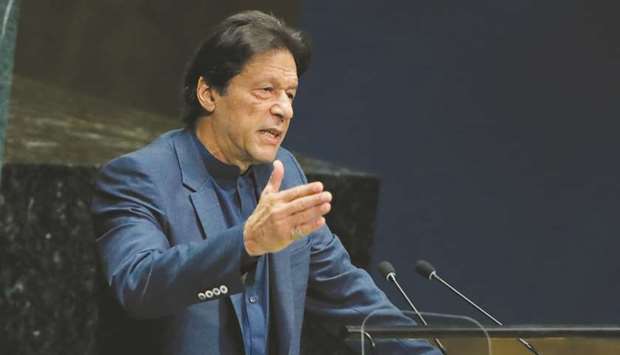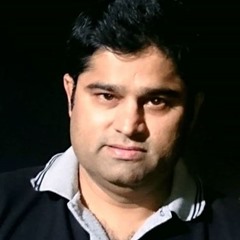Last Friday, Imran Khan outdid himself with a stirring extempore speech on the floor of the UN General Assembly that is likely to go down in history as one of the finest manifestations of statesman-like leadership.
For its pulse on the stark choices facing the world — starting with a resonant call to address the imbalances and hypocrisy of world powers on climate change to the end note on the humanitarian crisis in the world’s most dangerous flashpoint, it had virtually everything in sight for most stakeholders.
The usual form book at the UNGA is one of filling in the customary reiteration of rather staid policy outlines by heads of state. Circa 2019 has been no different. Except that the Pakistani prime minister had other ideas. In true Julius Caesar mould, ‘he came, he saw, he conquered’. But of course, that would be an easier explanation that does not necessarily take into account the hard yards Imran Khan did on the New York circuit like a man possessed before reaching the podium.
He made some sort of a record with dozens of meetings at maddening pace, including a prized presser with US President Donald Trump; key leaders of the US House of Representatives and Senate; ivy league American think tanks, environment and trade officials; and the top international media apart from routine sit-downs with world leaders on the sidelines.
But to return to the world’s highest forum, the Pakistani leader shone like never before. Certainly, one would be hard-pressed to recall any of his predecessors making so much as a quarter of his impact, save for foreign minister Zulfikar Ali Bhutto’s dramatic pitch in 1971 in much more turbulent times.
Imran Khan began with a clarion call on climate change, recounting his own country’s vulnerability to the phenomenon. As well, he listed his ruling Pakistan Tehrik-i-Insaf party’s singular contribution to the environment with its signature billion tree tsunami in the Khyber-Pakhtunkhwa province to global acclaim, and the ambitious plan to plant 10 billion trees in its stint in power now that it is in the Centre as well to counter the effects of global warming.
But Khan expressed his disappointment at those world powers who are directly contributing — and massively, at that — to carbon emissions, and resultantly, evading responsibility to come clean.
“Perhaps, some of the leaders who can do a lot do not realise the seriousness of the situation. There are a lot of ideas but they are nothing without funding. If nothing is done, humans are (prospectively) facing a huge catastrophe,” he warned.
The prime minister was also outspoken about another less spoken international crime: money laundered by the ruling elites, especially of the Third World, which then finds safe havens in the Western world.
“Corrupt elites must not be allowed to park their money abroad. Why do we have these tax havens? Why shouldn’t rich people pay taxes? Why are they legal, these secret accounts? This is devastating the developing world. The rich-poor gap is growing because of them,” he bristled.
He wondered how could poorer countries spend on human development if their monies were siphoned off in off shore accounts and urged the global powers to show political will to stem the rot.
“Sooner or later, there will be a crisis if the rich keep getting richer and the poor poorer. I hope the UN takes a lead on this. The IMF and ADB must find a way,” Khan drove home.
But purely from the Muslim world’s perspective, the most emotional part of the prime minister’s speech was a deep dive into Islamophobia. In a detailed dilation on the subject, and drawing from his personal journey as a cricketer and later philanthropist-turned politician who has lived long periods in the West, Khan explained in lay terms the deep cleavage between the East and the West on Islam that has led to so much heartburn amongst more than 2 billion Muslims across the world.
Citing deliberate provocations in and by the West following the events of Nine Eleven that pointedly denigrated the Prophet (peace be upon him) sometimes disguised as satire, Khan said the West largely did not comprehend the scale of damage they had wrought in hurting sentiments of the Muslims in whose hearts lives the Prophet (peace be upon him).
“It started after Nine Eleven and has grown at an alarming pace, and it started because certain Western leaders equated Islam with terrorism (by employing labels like “radical Islam”). There is no radical Islam or moderate Islam. There is just one Islam,” Khan emphasised.
The PM said the very concept was inherently contradictory, because “no religion teaches radicalism and the basis of all religions is compassion and justice.” Khan felt the use of “radical Islam” by Western leaders created an association between a whole religion and terrorism, leading people to suspect all Muslims. “How is a person in New York, in a European country, or in the Midwest of the US going to distinguish between who’s a moderate Muslim and who’s a radical Muslim,” he asked.
But at the same time, he candidly admitted the Western leaders weren’t solely to blame for the rise of Islamophobia. Muslim leaders, he said, were equally at fault, as the fear of being labelled as radical made them embrace the concept of so-called “moderate” Islam.
The touchstone of his address however, was the nearly two-month old lockdown in Indian-administered Kashmir. Moving beyond Islamabad’s known stance on the burning issue, Imran Khan made an impassioned appeal to the UN Security Council and world powers to heed their responsibility in preventing a potential face-off between two nuclear-armed neighbours in the event of things reaching a point of no-return. The tremolo to his heartfelt submission was unmistakable as he sidestepped the formal to engage in a more informal, if direct, pitch rooted in deep concern for the victims. So resonant was his message that its vibes were felt across the world as he immediately shot to No. 1 on Twitter’s global trends with no other leader even in the top 10.
* The writer is Community Editor. He may be reached at [email protected]

ADDRESS: Prime Minister Imran Khan gesturing during his address at the 74th session of the UN General Assembly in New York.

